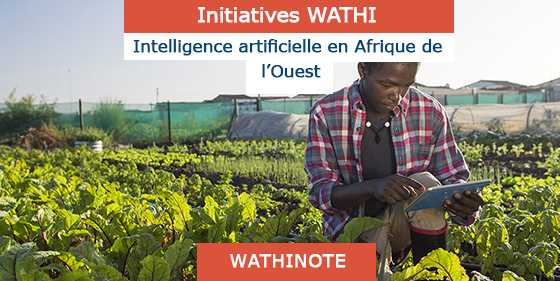

Authors : Ana Brandusescu, Juan Ortiz Freuler and Dhanaraj Thaku
Affiliated organizations : World Wide Web Foundation
Site of publication : webfoundation.org
Type of publication : Report
Date of publication : December 2017
Introduction
The Web Foundation takes a broad interpretation of AI, defining it as an intelligent system, which is able to solve problems by selecting the best possible action in a given scenario.
Understanding the implications of AI for digital equality is critical to ensuring that everyone — including governments, companies, civil society and ordinary citizens alike — is able to leverage AI’s potential benefits for society, while minimising its potential risks, including its potential to exacerbate existing inequalities.
Sectors and activities
In most sectors, AI is being used to circumvent existing economic inefficiencies and to improve access to public and private services. Examples of initiatives in all three countries studied (Kenya, Nigeria, South Africa) include:
- Health: In Kenya, Sophie Bot (a free chatbot that works on several popular messaging apps) relies on AI to process and reply to questions on sexual and reproductive health.
- Agriculture: In South Africa, Aerobotics is assisting the agricultural industry by using drone aerial imagery to identify problems in crop yields, which is important considering the challenges faced by the industry including sustained periods of drought.
- Fintech: In Nigeria, Kudi.ai has developed a system that allows users to improve money transfers. Using natural language processing and artificial intelligence, Kudi.ai attempts to make peer-to-peer payment easier for Nigerians using a chatbot that works on popular messaging apps, like Facebook Messenger.
- Public transportation: In Nigeria, RoadPreppers have developed a solution that allows users to navigate traffic congestion with driving directions and public transport options. In addition, the app lara.ng uses a chatbot to provide public transportation directions and fares for commuters in Lagos.
Main Findings
Local knowledge will allow regional players to capitalise on global trends. Much of the information circulating amongst local researchers regarding technology developments and trends comes from the United States and Europe (though India was also mentioned).
Understanding the implications of AI for digital equality is critical to ensuring that everyone — including governments, companies, civil society and ordinary citizens alike — is able to leverage AI’s potential benefits for society, while minimising its potential risks, including its potential to exacerbate existing inequalities
Local entrepreneurs are faced with a number of obstacles to deploying this local expertise in the AI field, including access to stable internet connections, limited sources of finance, and frequently insufficient complementary infrastructure (e.g., electricity, roads).
Government engagement in the promotion of AI research and use is low. Indeed, outside of financial support for academic research, the lack of government engagement in AI, particularly at the policy level, is one of the gaps highlighted.
Women remain largely excluded from the AI field. As throughout the technology sector, a significant gender imbalance persists in the AI field. This gender imbalance will reverberate through the job market, and can foster application designs that can reproduce and exacerbate the problems of unequal societies.
In addition, brain drain is a significant concern in this sector (as with other sectors in low- and middle-income countries), as local talent is systematically recruited by large US and European companies working on AI.
Policy considerations
It is essential for African governments to reassure all stakeholders that an ecosystem that effectively maximises potential and minimises harm is being developed.
Regarding governance, efforts should be put on working towards a national strategy on AI and new technologies, developed through broad multi-sectoral consultation; developing public sector expertise in AI, with leadership in relevant ministries leading this effort; establishing and define codes of conduct; ensuring the creation of systems of transparency, liability, accountability, justification, and redress for decisions made on the basis of AI.
Ensuring that trainings for AI development of AI are accessible by all, including low-income groups and investing in local research in AI, including in the STEM and social science/humanities fields is crucial for AI training and research development.
Government engagement in the promotion of AI research and use is low. Indeed, outside of financial support for academic research, the lack of government engagement in AI, particularly at the policy level, is one of the gaps highlighted
To fulfill the demand for data, governments should: promote access to free, open, and anonymised, curated datasets to train systems; encourage stakeholders to use open government data in AI as a way to improve data quality; promote the development of best practices and standards for AI design processes; ensure proper data protection legislation, regulation, and standards are in place across governments, companies, and civil society.
Finally, funding local AI startups and establishing frameworks to incentivise local AI innovations that support national development goals is a good start for encouraging innovation in the AI field.
Les Wathinotes sont soit des résumés de publications sélectionnées par WATHI, conformes aux résumés originaux, soit des versions modifiées des résumés originaux, soit des extraits choisis par WATHI compte tenu de leur pertinence par rapport au thème du Débat. Lorsque les publications et leurs résumés ne sont disponibles qu’en français ou en anglais, WATHI se charge de la traduction des extraits choisis dans l’autre langue. Toutes les Wathinotes renvoient aux publications originales et intégrales qui ne sont pas hébergées par le site de WATHI, et sont destinées à promouvoir la lecture de ces documents, fruit du travail de recherche d’universitaires et d’experts.
The Wathinotes are either original abstracts of publications selected by WATHI, modified original summaries or publication quotes selected for their relevance for the theme of the Debate. When publications and abstracts are only available either in French or in English, the translation is done by WATHI. All the Wathinotes link to the original and integral publications that are not hosted on the WATHI website. WATHI participates to the promotion of these documents that have been written by university professors and experts.
